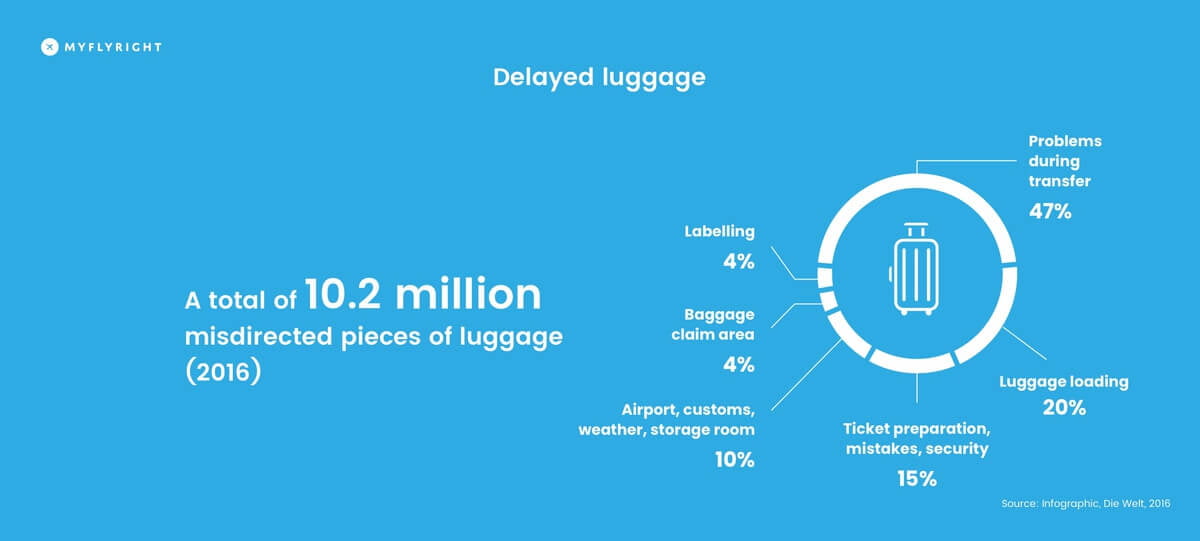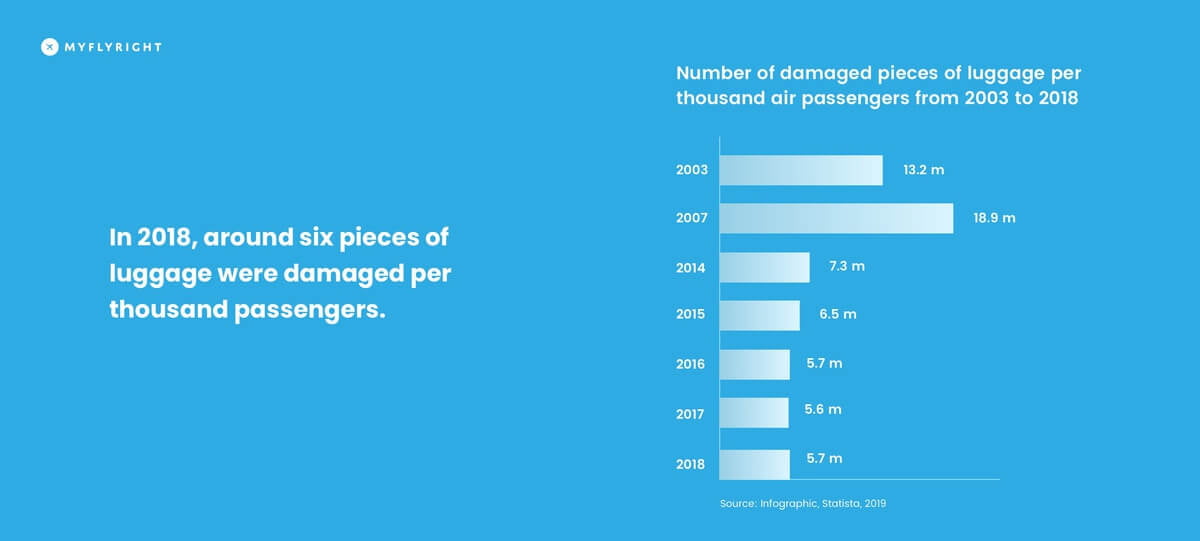Navigation to baggage claim
Baggage compensation
If your luggage arrives late at the airport, is damaged or completely lost, you are entitled to compensation of up to 1 500 €. You can also be reimbursed for replacement and so-called emergency purchases (such as toiletries and underwear) by the airline, within reason. An important note here is that if your baggage is delayed, you may only claim for emergency purchases during the time you do not have your baggage. For example, if your suitcase arrives 2 days late, you cannot then purchase any further hygiene products or clothing at the airline’s expense.
This right to compensation applies whenever the airline is responsible for any issues with your luggage while travelling, and also covers package and business travel. In addition, package travellers who experience baggage problems can receive a price reduction for every day they are affected.
Whatever difficulties you experience with regards to your baggage while travelling by air, it is key to report the incident to the airline as soon as possible, ideally before leaving the airport. Passengers should fill in a Property Irregularity Report (PIR) and gather all relevant documents and receipts. It is also important when enforcing your claim to adhere to the statutory time frames which are explained in detail later in this article.
The majority of passengers – around 80% - are not aware of their rights and only around 5 % of those who do claim, manage to enforce their rights. Airlines tend to use this to their advantage to avoid providing compensation.
At MYFLYRIGHT, the experts for passenger rights, our aim is to help those who experience issues during air travel by pursuing their claim for the compensation they deserve. By opting to use MYFLYRIGHT, passengers save time, stress and money. For this service, a commission fee of 25% plus VAT is only applied in the event of a successful outcome. If we have to engage our external lawyers, we charge a surcharge of 10%.
Lost, damaged or delayed baggage compensation
When you arrive at your destination and your suitcase turns up damaged, it is an unfortunate way to start a trip. Even worse is when you have to wait days for it to arrive, and what if it is never to be seen again? If you experience any of these problems while travelling, you have the right to compensation from the airline.
What is different compared with other flight disruptions, where a lump sum of compensation is provided, in case of luggage problems only a maximum liability limit is applied. However, when travelling with particularly valuable items, passengers can increase this limit. To do so, a statement must be completed, and a surcharge paid.
By using our compensation calculator, passengers can check their claims regarding luggage issues for free.
Baggage claim - compensation amount
The airline is obliged to pay up to 1 131 Special Drawing Rights (SDRs) to the passenger for any issues regarding luggage, when they are deemed responsible. SDR is an artificial currency consisting of US dollars, euros, yen and pound sterling, which is calculated daily. At the time of writing, 1 SDR equals 1.24 € and 1 131 SDRs is approximately 1 500 €.
The compensation from the airline should cover the following:
- Emergency purchases when baggage is delayed, however the airline is obliged to only pay for those items bought during the days that the passenger was waiting for their bags.
- In the event of damaged baggage, the repair or value of baggage, or any damaged contents.
- If luggage is lost, replacement purchases of contents, plus purchase of a new suitcase.
This amount is paid once per person for any checked luggage, regardless of whether the suitcase was shared with someone else or not.
Air passenger rights under the Montreal Convention
The legal basis for liability issues in international and civil aviation is the so-called Montreal Convention.
Here is a summary of the key points with regards to this agreement:
- Flight route – claims for compensation under the Montreal Convention apply only to international flights between contracting states;
- Responsibility – for checked baggage the airline is liable, regardless of fault, for any damage incurred during the journey. For hand luggage, the airline is liable only if the damage was caused by airline employees.
- Deadlines – ensure the claim for compensation is made within the statutory deadline, which are explained a bit later in this article.
Where does the Montreal Convention apply?
There are specific factors that determine for which flights the Montreal Convention applies. In total, 136 countries have ratified the agreement, including all EU member states, Australia, the USA and Japan.
Here is a more detailed explanation:
- The Montreal Convention applies to international flights between contracting states. This includes flights with planned stopovers in countries which have not signed the agreement.
- As the Convention was signed with Regulation (EC) No 889 / 2002, domestic flights within the EU are also covered.
Overview of routes with a claim for compensation:
Liability of airline - baggage claim
According to the Montreal Convention, the airline is liable for any issues with regards to checked luggage during the journey. This encompasses delay, damage and loss of luggage which occurred while it was on the aircraft or under the care of the airline. However, the airline is not liable for any luggage problems which are caused due to a defect in the item, or if the passenger is responsible - for example, not packing fragile items properly.
For hand luggage and personal items, which the passenger takes on board with them, the airline is only liable when they or their employees caused the damage. Passengers must have sufficient evidence that this is the case when making a claim.

YES
Airline carries responsibility
NO
Airline carries no responsibility
Deadline for your luggage claim
If your luggage is damaged, or hasn’t arrived at the destination airport, you should immediately go to the complaint counter or the counter of your airline. There, you will need to show your baggage tag and then fill in the Property Irregularity Report (PIR), which will outline what issue has occurred. Keep your copy safe, as it is evidence of your claim. You will be given a transaction number that allows you to view the status of your baggage, if it is still in transit, using the worldwide electronic baggage tracking system.
In order to claim compensation, the following deadlines must be observed:
- In case of delayed luggage, the claim must be made in writing to the airline no later than 21 days after its receipt.
- If baggage or its contents are damaged, passengers have up to 7 days to report the damage, in writing, to the airline.
- When baggage has not arrived after 21 days, it is officially deemed lost. From this point, there are 2 years in which the passenger can make a claim in writing for compensation against the airline.
Below is an overview of the deadlines which must be followed when making a claim:
The claim must be made within one of the contracting states of the Montreal Convention and you have the choice between:
- The court of the location where the airline has its headquarters.
- The court of the location of the branch office in which the air travel tickets were purchased.
- The court at the destination.
Luggage problems during business & package travel
When you see your luggage arrive damaged on the conveyor belt, or it doesn’t turn up at the airport at all, this can really spoil a trip. Whether this means you don’t have that suit for a key business meeting, or you are missing beach essentials for your holiday, this is of course a frustrating situation.
The same rights apply for business and package travel as for individual travellers; however, there are a few differences to note. For example, when taking a trip as part of a package tour, and baggage issues arise, passengers can claim for a reduction in price for each day this impacts them. Certain percentages will be applied to this price reduction and to get an overview of this, the Kempten Table can be referenced.
Baggage problems during business travel
When travelling for business trips, what qualifies as an emergency purchase? You are probably required to attend meetings in certain attire, and jeans and a T-shirt aren’t likely to be appropriate. In such instances, a suit and tie are considered necessities and the costs for these items of clothing are therefore refunded to you by the airline. However, bear in mind that the maximum you can be compensated for is 1 500 €, so do not go overboard with your spending. You will also find more information on the topic in our article Business travel.
Baggage problems on package holidays
If you experience luggage problems during package travel, you should contact not only the airline, but also the tour operator. Delayed, damaged or lost luggage falls under the category of travel disruptions and the tour operator is obliged by law to ensure your journey is as promised at the time of purchase. If they are unable to provide specific solutions for your baggage problem, you are entitled to a price reduction of the cost of your trip.
In the case of lost luggage, in addition to the material damages claim (for emergency or replacement purchases), passengers may also be able to make a non-material damages claim due to a holiday being ruined or lost vacation time. However, this is only granted if the travel disruption results in a reduction claim of at least 25% for the journey.
Luggage issues: Kempten Table
The Kempten Table consists of a summary of judgements made in Germany involving disruption while travelling as part of a package tour. Although the Kempten Table is not legally binding, it nevertheless serves as a useful guide to passengers who have had issues regarding luggage during package travel.
Costs for enforcing your claim – luggage
When deciding to make a claim against the airline, you have a few options. You can choose to take on the task yourself or you can enlist services to help you. Pursuing your case independently will save you MYFLYRIGHT’S commission in the event of a successful outcome. However, it is important to be aware that enforcing your passenger rights on your own is a time-consuming and often stressful process. When you consider that around 50% of the cases we receive go to court, this process can become rather costly. When a case is rejected in court in Germany, for example, the passenger is liable to pay all legal and court fees.
The table below shows the costs incurred in a claim for compensation in the amount of 800 €.
The services of MYFLYRIGHT may be a better option to ensure your claim is as stress-free as possible.
However, if you still want to try to claim independently, the tips and information in the following section will be of use.
Baggage claim form
When enforcing your rights on your own, the following steps should be followed:
Step 1. You have already filled in the PIR form at the airport, now it is time to write a letter to the airline. You can create your own letter or use our letter template. If you choose our template, you can either fill it in online and send it via email, or print it out, fill it in and then mail it. In both cases, all receipts for replacement and emergency purchases must be attached – when emailing, you can scan these. It is advised when mailing the letter to use registered post, in order to have evidence of when the airline receives it. If necessary, this information can later be used in court.
The letter should include the following information:
It is advisable to set a deadline for your compensation payment. The recommended period is 2-3 weeks. If there is no response from the airline within this deadline, move on to Step 2.
Step 2. Now you have different options. You can either seek the help of legal services to file a lawsuit against the airline or give the airline a second chance to respond, by writing them another letter. In this case, set the deadline again for 2-3 weeks.
This step can start to become costly and time consuming. At this point you still have the possibility to seek the help of MYFLYRIGHT, who will pursue your claim for you with no cost risk.
Step 3. If there is still no response from the airline after your second letter, it is time to pursue your case in court. When faced with a lawsuit, airlines must respond and can no longer avoid your claim.
Remember that in some countries, such as Germany, you must pay all legal fees if your case is rejected by the court.
To avoid this, you still have the option of choosing the services of MYFLYRIGHT, where your claim will be processed by our team of experts with no financial risk, saving you plenty of time and frustration.
Statistics on delayed baggage
According to the International Air transport Association (IATA), 2017 saw a record number of passengers travelling by air - over 4 billion worldwide. Thanks to low-cost airlines, an increasing number of passengers can afford to travel further for their holidays and more flight options are being offered every year. Flight disruptions are a part of air travel and issues when flying sometimes cannot be avoided.
As stated in the 2016 SITA Baggage Report, a total of 10.2 million pieces of luggage were misdirected that year, 77% of which arrived late. However, airlines and airports are working to improve their systems. For example, the number of misdirected baggage has steadily dropped since 2007.
Almost half of all baggage delays are caused by short reloading times for transfers. 15% are due to errors in ticket preparation, mistakes and security issues and in 16% of cases, the luggage did not even leave the departure airport. Customs, storage conditions, or issues at the airport (such as strikes) are responsible for 10% of delayed baggage. On account of incorrect luggage labelling, loading onto the wrong aircraft and issues at the destination airport, 4% of baggage did not make it to the place of arrival on time.
Here is an overview of statistics relating to delayed luggage in 2016:
Lost luggage: Statistics
In 2016, as per the SITA Baggage Report, 5.73 pieces of luggage per 1 000 passengers were lost worldwide. Although this may seem positive at first glance, it means that 1 to 2 passengers per average flight carrying 200 passengers will arrive at their destination without their luggage.
Sometimes this is due to luggage being stolen or lost by the airline, but it can also be a result of passengers confusing their bags with someone else’s. It is therefore recommended to attach a tag with your name and contact details to each piece of luggage, and to carry valuables with you in your hand luggage.
Damaged luggage: Statistics
The amount of baggage damaged has declined sharply in recent years. While in 2007, about 19 pieces of luggage per 1 000 passengers were damaged, in 2018 the number dropped to just under 6. There is always the risk that luggage can fall off the conveyer belt or the baggage cart, or it may be handled roughly during the journey. One way of reducing the possibility of your luggage getting damaged is to use a wrapping station, which are common in many airports.
Overview of the number of damaged pieces of luggage per 1 000 passengers between 2003 and 2018:
Luggage problems FAQ
When do I have a right to compensation for luggage problems?
You are entitled to compensation if your checked baggage was lost, damaged, or delayed, under the Montreal Convention.
How much compensation can I get for luggage issues?
You may claim up to about €1,500 per passenger, depending on the actual damage, delay, or loss of your baggage.
How do I claim compensation for luggage problems with MYFLYRIGHT?
Enter your flight details on www.myflyright.com, upload your booking confirmation or boarding pass, and baggage receipt, and we will take care of the rest.
How long does it take to get compensation for luggage issues?
It usually takes a few weeks to a few months, depending on the airline and the complexity of the case.
Do I have to pay anything if my luggage claim is not successful?
No. Our service is completely risk-free. You only pay commission if we successfully get your compensation.
Why should I use MYFLYRIGHT instead of handling the luggage claim myself?
Airlines often reject or delay baggage claims. MYFLYRIGHT uses legal experts and experience with international cases to enforce your rights at no upfront cost.
How much is your compensation?

You might also be interested in












